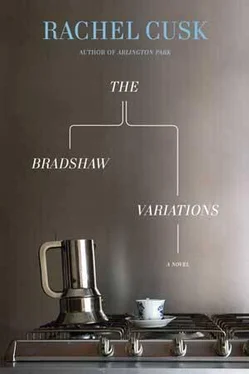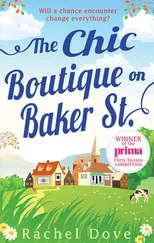He has irritated her. He has made her angry. The black shapes of birds pass silently across the dun-coloured sky. Claudia lies beside him, somewhat stiffly, on the bed. She does not take off her shoes. But she rests her head in the crook of his arm so that he can stroke her hair, which is dirty-looking today and held back by numerous little silver clips. This is what amazes him, the way people give themselves, the way they create, in the emptiness of the coming moment, another instant of life. He hears it rising from the blankness of the street: the woman so patient with her child, the man whistling for his dog. He thinks how virtuous they are, how good. The winter trees make stark, cross-hatched shapes beyond the window. He doesn’t think people can ever be as good consciously as they are by instinct, on an empty street on a midweek morning in November. As his wife is, in this throwaway bit of the day, lying beside him on the bed.
‘Do you want anything?’ she says, when she is standing in the doorway again, straightening her clothes.
‘Just a little soup,’ he says weakly. ‘Nothing much.’
‘Soup,’ she says. ‘Any particular kind of soup?’
‘Whatever there is. The one you make with leeks is very nice. And perhaps a roll, just one, with some butter.’
‘Right,’ she says.
He sees her look of resignation, of momentary oppression. Perhaps when he is at work she forgets all about him. What does she think about? What is he deflecting her from, stewing here in sheets that smell of himself, in their room that is becoming steeped in his own presence? She should air it, straighten the covers and open the windows, put flowers in a vase. Instead she straightens her own clothes, and looks slightly grim around the mouth when he asks for soup. In the window of the house opposite he can see a figure behind the dark glass. He sees a pale arm, lifting and moving, lifting and moving. He sees a dim fall of hair to a white shoulder. It is a woman ironing. He can see the metallic glint of the object, the pressure and repetition of her movement. Her face is in shadow. She is so steady, so industrious. He watches her, comforted. It is true that life lays a fetter on love: this, he thinks, may be Claudia’s secret. There is virtue in industry, even as it sets its limitations on affection, even as it stints the hand of feeling. It is good that Claudia doesn’t drop everything to lie beside him all day. He remembers the way his mother used to look after him when he was ill. There were always flowers in a glass by the bed, and a tray coming up the stairs. He remembers the feeling of paralysing love, the way she seemed to want to keep him there and he half-wanted to be kept, as though she had stolen him back from the world in order to perfect her care of him.
He sleeps for a while, and when he wakes he can smell the soup from downstairs. The day is unchanged. The bird is calling at the window. Ree-ree-ree-ree-ree . The telephone rings and he hears Claudia speaking. She speaks for a long time. Several times she laughs. Later she brings up a tray and puts it beside him on the covers. It is a quarter past two: his mouth is dry and bitter-tasting with hunger. The soup is pale green, thick, flecked with herbs, just as he had imagined it would be.
‘Where’s yours?’ he says. ‘Aren’t you having any?’
She is moving around, picking things up, keeping out of his reach.
‘I had mine earlier downstairs. I was hoping to get into the studio this afternoon. Have you got everything you need?’
He remembers this too, the feeling of his mother’s secret life, and of himself as an interloper, eavesdropping on it; as though home were a trick, an artifice, and his illness the manifestation of his mother’s guilt. After she goes he eats the soup, imagining her sitting alone at the table downstairs, eating hers.
The house is empty. Olga moves through the rooms, looking at things. She is back early today, with a headache that sends big shivers all through her body. They let her go home. All the way on the bus the headache beat her, like a stick beating a drum. And then the driver shouted at her because she pressed the button too late, and he put the brakes on hard so that she was thrown against the rail. It hurt her: she has a red welt on her arm. Why did he do that to her? If she ever meets him again she will ask him. She has no friends here, no family, no language to express herself in. Why was it her he chose to hurt?
She stands in the room with the velvet sofa, where she is never invited, where they sit in the evenings and talk. There are chairs, a leather one and another one with an old-fashioned flowery cover. There is a table all piled up with newspapers and magazines and two dirty glasses. There is a piano, old, brown-coloured. The curtains in this room are green. She likes the material, raw silk, and she likes the gold mirror above the fireplace and the things that stand on the mantelpiece, a little gold clock with tiny engraved pillars like a temple, a paperweight with a blood-coloured peony engulfed in the glass, a sky-blue china vase with a narrow neck. There are little white figures engraved on its sides. They are dressed in tunic-like clothes, like gods and goddesses. They are dancing and talking and feasting all the way around. She looks at the books, leaning higgledy-piggledy on the shelves. They are dusty, as the piano is. But the chairs and the sofa look friendly, like people talking, and the curtains make her think of the ball gowns actresses wear in old films. It is a good room, a warm room, but they never ask her to come in and sit down.
She goes upstairs to their bedroom, dusty too, clothes everywhere, the bed unmade. One night she heard them shouting in here. She does not like people who shout. But in the morning they were normal again, as though nothing had happened. The bed is like a rat’s nest with the covers all tangled. It is strange, that two people would agree to leave it in that state. It is mysterious. She herself would refuse to get into that bed. She doesn’t understand why they don’t make their room nice. It is disgusting, to live like this. She opens a drawer, glances in. Men’s underclothes, neatly folded. She is surprised. He is so untidy, so lazy, and yet in his own drawer where no one can see, everything is in order. She has come home at three or four in the afternoon and found him lying on the sofa, reading a book, while downstairs the kitchen is full of terrible sights and smells, flies buzzing around the dirty plates, the unswept floor crunching underfoot, pans with burnt food at the bottom left sitting there for days. She would never have guessed that he folded his underpants.
In her own room everything is clean and orderly. The white winter sun is coming through the window. There is a bluebottle swimming noisily at the glass. She swats it dead with a rolled-up magazine. The headache has left a hollow behind it. She touches the red mark on her arm with her fingertips. She feels lonely. She sits on her bed and dials her mother’s number.
The piano teacher lives with his boyfriend in a basement flat on the other side of town. Ignatius is a pianist too: his grand is wedged into the cramped bedroom while Benjamin’s upright occupies the living area, where brown damp stains spot the low, sagging ceiling, and the window looks out onto a small concrete courtyard and a flight of mildewed steps up to the street.
Even before he arrives, Thomas feels the atmosphere begin to act on his attitude to culture like astringent on a raw wound: the rows of run-down houses, the pavements piled with broken furniture and bloated sacks of rubbish, the rusted railings and bright venomous green of Benjamin’s stairway, even the chipped front door, low like the door to a dungeon — it is all bracing, corrective, so that when the door opens and Benjamin appears, Thomas feels a confusing, lover-like rush of sensation towards him. Benjamin is not especially beautiful: it is just that in the squalor of his own hallway, his clean humanity is momentarily overwhelming. Thomas is slightly ashamed of the pleasure it gives him to look at Benjamin’s milk-coloured skin, so restful to the eyes; at his hair, which is black and glossy, and at his pink mouth, with its choirboy’s expression of faint astonishment. His body suggests itself through his unexceptional cardigan and corduroys like a statue through a dust sheet. Lately Thomas has come to realise, as they face each other in the doorway, that Benjamin is pleased to see him too. A feeling of warmth, almost of excitement, is shed in the space between their irreconcilable bodies.
Читать дальше












